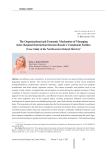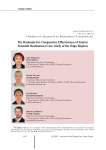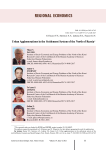Regional economy. Рубрика в журнале - Economic and Social Changes: Facts, Trends, Forecast

Статья научная
According to some researchers, in recent years there has been an upward trend in predominant stagnating regions in Russia. The reasons for this include low innovation activity of the periphery, deindustrialization, predominant extractive industries, capital exports, growing social and property stratification and other equally important reasons. The current economic and political crisis in our country is both a threat, an opportunity and an impetus to restructuring the regional economy. In these conditions it becomes extremely necessary to search for new growth points in the regional economy, support for the most promising industries, and efficient resource allocation. Inter-regional cooperation is the most important area of the regional policy, ensuring progressive balanced socio-economic development of regions based on establishing long-term, equal and mutually beneficial relations between them. The importance of inter-regional cooperation for the development of modern Russia's constituent entities is determined by the fact that it strengthens economic ties between them, optimizes the location of infrastructure facilities based on cooperation of their activities, eliminates inefficient financial costs associated with the creation of duplicate economic structures in Russia's constituent entities and unjustified inter-regional competition, combines the regions' economic potential for implementing the most large-scale investment projects, spreads innovative experience in innovation development...
Бесплатно

Статья научная
The article presents the analysis of long-term tourism development programs of the Volga Region. Great attention is given to the sector's financing measures set out in development programs. Domestic and foreign tourist potential assessment methods are analyzed. Tourist potential dynamics of the Volga Region is studied based on expert opinion. Using econometric approach the authors study the correlation between tourism investments and incomes of the Volga Region for the past six years - from 2009 to 2014. The analysis was carried out using statistics provided by the Russian Tourism Association and the Federal State Statistics Service of the Russian Federation by category of profitability from paid tourist services and from hospitality and catering services. The conducted analysis helped construct the figures showing the differentiation of the Volga regions by tourism investment efficiency and tourist potential realization. It is shown that tourist potential of the territories and its realization are highly differentiated...
Бесплатно

Urban agglomerations in the settlement system of the north of Russia
Статья научная
The article examines the evolution of the formation of cities and urban agglomerations in the North of Russia. The aim is to identify cities that meet the criteria of “northern urban agglomeration” from the large cities in the North of Russia. We propose criteria and indicators that make it possible to distinguish urban agglomerations in the urban space; it is noted that for northern urban agglomerations the evaluation criteria can be applied less strictly and indicators less important. We analyze the urban settlement of northern Russia, focusing on northern cities, their structure and the average density of settlements; we consider separately urban-type settlements that contribute to the population density of northern territories, increasing the density of settlements. The focus is on 18 cities with more than 100,000 inhabitants and four cities with a population of a hundred thousand in different years, the core cities have at least two satellite settlements, according to the criteria proposed, they correspond to the concept of an urban agglomeration core city. We consider and group the selected urban agglomerations according to the structure of satellite settlements and the population living in the zones located within 50, 100 and 150 km from the core. With the help of a review of domestic and foreign literature, we have revealed the essence and content of the category “agglomeration effect”. The article identifies three types of agglomeration effects: local objects sharing; cost reduction; and labor pooling. There are two types of effects: localization (clustering) and urbanization effects; the localization effect is the result of enterprises working together in a common area, the urbanization effect is the concentration of organizations in one area, regardless of whether there is thematic proximity between them. Along with the advantages, urban agglomerations cause environmental, economic, political and social problems and pose threats to the stability of small and medium-sized cities; increasing rural deprivation; which will cause further depopulation of large parts of the country, putting the security and integrity of the country at risk.
Бесплатно

“Smart” benchmarking as a basis for strategic planning in regional development
Статья научная
Addressing the problem of scientific substantiation of the region’s development priorities is an urgent issue for both regional researchers and territorial managers. At the same time, when determining the areas of development, the emphasis is often put on successful experience of the leading territories. This method of transplantation of best practices in order to improve the performance of the object under analysis is called benchmarking. In classical understanding, the key stages of regional benchmarking are: selection of the leading region for comparison, identifying the differences between the leading region and the region under analysis, analysis of key success factors of the leading region, and implementing successful experience in the economic practice of the research area. At the same time, the absence of preliminary analysis of reasons and prerequisites for achieving leadership by best regions, comparison of territories with objectively different characteristics of socio-economic development, leads to non-compliance with the most important principle of regional development planning - the principle of goal-setting...
Бесплатно

